高中英语Module3ForeignFoodSectionⅠIntroduction&Reading-Pre-reading教学案外研选修8
Module 3 Foreign Food内容教学讲解

Module3Foreign Food教材分析与教材重组1.教材分析本模块以Foreign Food为话题,通过与饮食文化相关的材料反映了世界各地饮食文化的差异和丰富多彩,从而激发学生的学习兴趣和了解世界饮食文化的愿望,使他们更加热爱生活,追求生活中美好的事物。
本模块所选内容贴近学生生活,教师可以借助听、说、读、写和讨论等一系列扎实有效的教学活动,充分调动学生的积极性,提高其语言运用能力。
1.1INTRODUCTION以几幅食物图片切入话题,然后让学生讨论有关食物的谚语,为后面的阅读做好铺垫。
1.2READING AND VOCABULARY(1)中包括两篇文章:第一篇文章主要通过一个美国人第一次参加中国宴席和吃臭豆腐的经历以及他对于中餐从吃惊到接受的过程,反映了中餐的特点和东西方饮食文化的差异;第二篇是描述一个中国人第一次在英国吃“西餐”的经历,以及因饮食文化的差异所引发的感受。
从这两篇文章,我们可以看出中西方饮食文化的差异。
两者各有千秋,“中餐”种类丰富,味美可口,而“西餐”似乎很简单,但餐桌礼仪却值得我们借鉴学习。
这两篇文章语言简练,幽默风趣。
与课文相关的练习Activities1and3要求学生采用快速浏览的方法确定相关的主题,潜移默化中培养学生skimming这一重要阅读技巧;Activities4and5要求学生掌握与课文相关的语言知识;Activities6 and7要求学生进一步理解课文并在此基础上进行讨论。
The First Period ReadingTeaching goals教学目标1.Target language目标语言a.重点词汇和短语owe to,be obsessed with,get used to,somewhat,requirement,altogether,mushroom, banquet,no wonder,infamous,manner,make out,fixed,unrecognizableb.重点句子Everything you see I owe to spaghetti.The first six or seven dishes seemed to fill the table,with plates dangerously balanced one on top of another.No wonder my fellow guests had had only a few bites of each dish.The first time I saw a three-year-old kid cheerfully chewing a chicken’s head I had bad dreams for weeks.But one thing I do admire is the polite manner in which British people eat,even if it is just a potato.2.Ability goals能力目标Enable the students to talk about the differences between foreign food and Chinese food.3.Learning ability goals学能目标Help the students learn how to talk about the differences between foreign food and Chinese food.Teaching important points教学重点Get the students to have a good understanding of the dining cultures of both China and the West.Teaching difficult points教学难点How to analyze the text and grasp the main idea of the text.Teaching methods教学方法Reading and discussing.Teaching aids教具准备A tape recorder and a multiple-media computer.Teaching procedures&ways教学过程与方式StepⅠLead-inT:Good morning,class!Ss:Good morning,Mr/Ms...T:As we know,food is very important in our life.We can’t go without food.Chinese food is famous in the world and we are all familiar with it.In this module we’ll learn something about foreign food.There are lots of differences between Chinesefood and foreign food.Have you ever had foreign food?What do you think of it? S:Yes.I have had at McDonald’s.It was delicious,especially the fried chicken.S:Yes.I think foreign food is worse than Chinese food.There are many varieties of food in China which are carefully cooked.However,foreigners like raw vegetables and even raw fish.They also like cold food.It is terrible,I think.S:Yes.In my opinion,though foreign food is not more delicious than Chinese food, their table manners are worth learning.T:Good.Let’s look at the pictures on Page29.What can you see in the picture? Ss:Many kinds of food.They look very nice.T:Yes.There are some quotations about food on Page29.Now,read them quickly and then work in pairs and discuss what the quotations mean.Allow them enough time for the discussion.Answering the questionsT:Are you ready?Ss:Yes.T:What does the first sentence“Everything you see I owe to spaghetti”mean?S:The saying is from the Italian actress,Sophia Loren.By saying this she means she likes eating spaghetti and it is spaghetti that helps build her good figure.T:What does the second sentence“Eat little,sleep well”mean?You can answer in Chinese if necessary.S:吃少睡好。
高中英语Module3ForeignFood单元加餐练(一)-(二)(含解析)外研版选修8(最新整
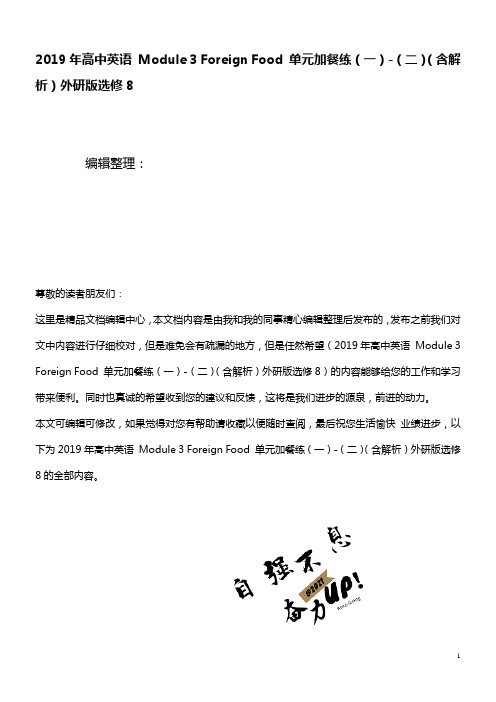
2019年高中英语Module 3 Foreign Food 单元加餐练(一)-(二)(含解析)外研版选修8编辑整理:尊敬的读者朋友们:这里是精品文档编辑中心,本文档内容是由我和我的同事精心编辑整理后发布的,发布之前我们对文中内容进行仔细校对,但是难免会有疏漏的地方,但是任然希望(2019年高中英语Module 3 Foreign Food 单元加餐练(一)-(二)(含解析)外研版选修8)的内容能够给您的工作和学习带来便利。
同时也真诚的希望收到您的建议和反馈,这将是我们进步的源泉,前进的动力。
本文可编辑可修改,如果觉得对您有帮助请收藏以便随时查阅,最后祝您生活愉快业绩进步,以下为2019年高中英语Module 3 Foreign Food 单元加餐练(一)-(二)(含解析)外研版选修8的全部内容。
单元加餐练(一)~(二)加餐练(一) 完形阅读组合练Ⅰ.完形填空In our lifetime, we meet many types of people. For me, the ones that stand out are those who overcome __1__ and have a positive outlook on life。
Most recently,I have had the __2__ of communicating with Jaymac。
Jaymac became __3__ at the age of 10。
He had a bad condition that left him __4__。
He was only able to walk with the __5__ of crutches (拐杖)。
Jaymac is now 60 years old. As you will __6__ in the words quoted below he has a great outlook on __7__,“Life is full of compensations (补偿), though。
外研版高中英语选修8复习课件 Module3 Foreign Food

4.infamous
d.(of food) that smells or looks attractive;making you
feel hungry or thirsty
5.obsess e.the way in which something is done
A.too simple
B.prepared more carefully
C.too easy
答案B
.
for the writer.
一
二
三
四
五
5.What did the writer want to tell people by telling about his
experience at the banquet?
heroin,the young man sold all he had to pay
for the drug.
答案(1)be obsessed with/by
(2)Obsessed with/by
1
2
3
4
5
3.No wonder my fellow guests had had only a few bites of each
Section Ⅰ Introduction,Reading &
Vocabulary
一
二
三
四
五
一、把下列英文释义与所对应的单词匹配
1.chew
a.to think or worry about something constantly
高中英语:Module 3 Foreign Food--reading practice教案(外研版选修8module 3)

Foreign Food--reading practice教案(外研版选修8module 3) Step 1Revision:1. Review the grammar.2. Check the exercises on Grammar.Step 2ReadingFinish Ex 1, 2 and 4:1. Pair work, Finish Activities 1 and 3.2. Ask the student to read the text and finish Activities 2 and 4.3. Discuss the exercises in Activities 5, 6.4. Pair work: Master the main words in Activities 1 and Activities. Then find out the example sentences in the text.Find main ideas of the text.Step 3Main language points1. containPig iron may contain 4%of carbon.生铁可含百分之四的碳。
At the sight of this cruelty, he could hardly contain his anger.见此残暴情形,他无法克制自己的愤怒。
A pound contains 16 ounces.一磅等于十六盎司。
12 contains 2, 3, 4 and 6. 12可以用2, 3, 4, 6来除。
They are making a plan for containing the enemy attack.他们在制订牵制敌人进攻的计划。
contain hold acmodate都含“包含”、“容纳”的意思。
contain着重“其中确实包含有”,如:The bottle contains water. 这个瓶子里有水。
2018_2019学年高中英语Module3ForeignFoodSectionⅠ

Module 3 Foreign FoodDoes hamburger come from China?The world's first hamburger doesn't come from where you think it comes from. It wasn't invented in the United States, and it didn't originate in Germany. Yes, the world's first hamburger comes from China.If you're scratching your head right now, you're not alone. But Chinese hamburgers are very real and they definitely predate the hamburgers we call our own in the U. S. Known as roujiamo, which translates to “meat burger” or “meat sandwich”, they consist of chopped meat inside a pitalike bun, and they've been around since the Qin Dynasty, from about 211 BC to 207 BC. Despite the differences between this Chinese street food and our Americanstyle burgers, the roujiamo has been called the world's first hamburger.The roujiamo originated in the Shaanxi Province of China, and is now eaten all over the country. It's typically prepared and eaten on the street. The dough for the bun, or mo, consists of a simple mixture of wheat flour, water and maybe yeast. Of course recipes may vary, but this basic equation makes for a chewy and subtle pillow for the delicious filling. While the mo is traditionally baked in a clay oven, today it's often fried in a pan. They may look a little like Chinese steamed buns or baos, but the dough for those are, of course, steamed, not baked or fried.The meat filling might consist of chopped pork, beef, lamb or chicken that has been stewed with a variety of spices (香料), like ginger (姜), cloves (丁香) and star anise (八角). You might also find herbs like cilantro (香菜) or greens like lettuce garnishing the sandwich.,阅读障碍词]originate vi.发源;起源predate vt.在日期上早于(先于)chop vt.剁碎;砍bun n.圆面包dough n.生面团yeast n.酵母equation n.等式;相等chewy adj.耐嚼的stew vt.炖garnish vt.加饰菜于Ⅰ.Match the word with its meaning.1.owe A.一道菜2.taste B.甜食3.obsess C.臭名昭著的,声名狼藉的4.banquet D.咀嚼5.dish E.贪婪地6.greedily F.方式;方法7.chopstick G.要求8.dessert H.宴会9.chew I.固定的10.infamous J.使着迷11.appetising K.无法辨认的12.manner L.(常复)筷子13.requirement M.开胃的,增进食欲的14.fixed N.应给予15.unrecognisable O.味道答案:1~5 NOJHA 6~10 ELBDC 11~15 MFGIKⅡ.Write down the meaning of phrases in each sentence.1.Many boys are obsessed with football.对……着迷2.What you had done went against his wishes.违反,违背3.He has got used to living in such difficult conditions.习惯于4.He has passed the exam. No wonder he is so happy.难怪5.There are so many people at the school gate that I can't make out what happened.看出;理解6.In order to end up in success, he worked very hard.结束7.What we have in common is the habit of early rising.与……有共同点Ⅰ.Look at the following pictures and tell what they are.答案:①chopsticks②fork and knife③salad④cheese sandwiches⑤soup ⑥dumplingsⅡ.What are the two biggest fast food restaurants in the world?答案:KFC and McDonald'sⅠ.FastreadingChoose the best summary of each passage.1.Passage 1:A.The writer doesn't like Chinese food.B.The writer hasn't got used to most Chinese food yet.C.The writer likes most Chinese food.2.Passage 2:A.The writer doesn't like British food.B.The writer doesn't like the way British food is prepared and served.C.The writer doesn't like the way the British eat.答案:1~2 CBⅡ.CarefulreadingRead the text carefully and choose the best answer.1.It seems that the writer in Passage 1 felt ________ to find so many dishes were served at a banquet.A.disappointed B.interestedC.surprised D.terrible2.We can infer from Passage 1 that the writer ________.A.has a low opinion of Chinese foodB.gets a good impression of Chinese foodC.thinks Chinese people waste lots of foodD.thinks the people at the table have small appetites3.From Passage 2, we know that Chinese food ________.A.pays much attention to its beauty and style besides the tasteB.includes various kinds of mashed foodC.often has an unrecognisable shapeD.is prepared with little care4.What impresses the writer most according to Passage 2?A.The taste of British food.B.The names of British food.C.The styles of British food.D.The manner in which the British eat.答案:1~4 CBADⅢ.StudyreadingAnalyze the following difficult sentences in the text.1.Their salad, for example, is made from vegetables which are only washed before serving, while Chinese food is prepared more carefully.[句式分析] 本句由表示对比的while 连接一个复合句和一个简单句; while 前的复合句中, for example 作插入语, which引导的定语从句修饰先行词vegetables。
2019_2020学年高中英语Module3ForeignFoodSectionⅠIntroduction
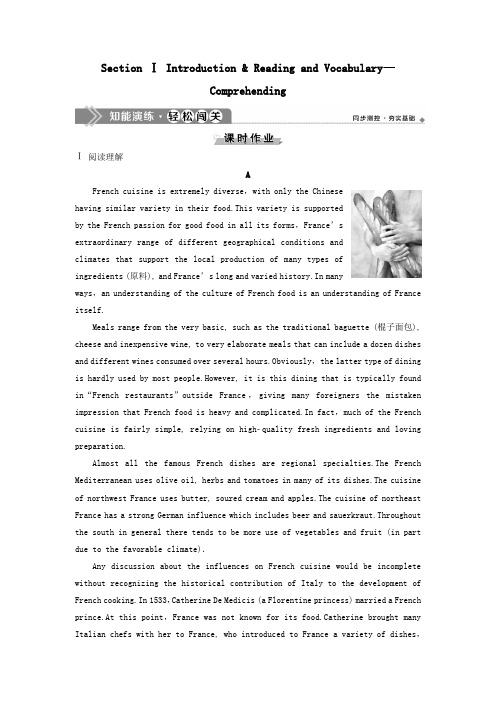
Section Ⅰ Introduction & Reading and Vocabulary—ComprehendingⅠ阅读理解AFrench cuisine is extremely diverse,with only the Chinesehaving similar variety in their food.This variety is supportedby the French passion for good food in all its forms,France’sextraordinary range of different geographical conditions andclimates that support the local production of many types ofingredients (原料), and France’s long and varied history.In manyways,an understanding of the culture of French food is an understanding of France itself.Meals range from the very basic, such as the traditional baguette (棍子面包), cheese and inexpensive wine, to very elaborate meals that can include a dozen dishes and different wines consumed over several hours.Obviously,the latter type of dining is hardly used by most people.However, it is this dining that is typically found i n“French restaurants”outside France,giving many foreigners the mistaken impression that French food is heavy and complicated.In fact,much of the French cuisine is fairly simple, relying on highquality fresh ingredients and loving preparation.Almost all the famous French dishes are regional specialties.The French Mediterranean uses olive oil, herbs and tomatoes in many of its dishes.The cuisine of northwest France uses butter, soured cream and apples.The cuisine of northeast France has a strong German influence which includes beer and sauerkraut.Throughout the south in general there tends to be more use of vegetables and fruit (in part due to the favorable climate).Any discussion about the influences on French cuisine would be incomplete without recognizing the historical contribution of Italy to the development of French cooking.In 1533,Catherine De Medicis (a Florentine princess) married a French prince.At this point,France was not known for its food.Catherine brought many Italian chefs with her to France, who introduced to France a variety of dishes,food preparation and dining practices.Although France and Italy obviously have evolved very different food cultures, much of France’s current food culture can be traced back to this time.【解题导语】法国美食闻名天下,本文向我们介绍了很多关于法国美食的信息。
(教师用书)高中英语 Module 3 Foreign Food教案 外研版选修8

Module 3 Foreign Food【美文阅读】随着中国经济的发展,一些快餐店,如肯德基、麦当劳、温迪快餐、必胜客等如雨后春笋般地在中国涌现,而这也引起了一些文化冲突,让我们先睹为快吧。
Traditional Chinese hotpot challenges foreign fast food Chongqing hotpot,a century old Chinese dish named after its birthplace-Chongqing City-has become a potential(潜在的)rival to the global fast-food giants like McDonald's,Kentucky Fried Chicken and the US-based Dicos.Invented by local boatmen and dockers in the late 19th century and early 20th century,the dish was made from cheap meats,hot pepper (胡椒粉) and ginger (姜),which after being boiled together in a big pot and eaten can effectively dispel(驱散)cold,damp and tiredness.Xu Zhongmin,vice mayor of the hilly municipality(直辖市),said more than 1,000 hotpot restaurants appeared in the city alone these days,which mainly in the form of chain restaurants had spread to 23 provinces and municipalities in China and foreign countries including the United States.The trend(趋势)has caught the attention of global fastfood giants who claim they have never met a completely indigenous(当地的)Chinese restaurant chain.“Hotpot may be an exception,”said Huang Yuejin.According to him,a common weakness for most Chinese restaurants is that the tastes of their dishes rely too much on the cooking skills of individual chefs which makes it extremely difficult for chain restaurants to achieve standardized(使标准化) production.To solve this problem,Chongqing hotpot restaurants learned from the western chains to standardize their raw materials,condiments (调味品) and menus from which diners may choose.Chou Yi,secretary-general of the Chongqing Hotpot Association,predicted that with more and more people trying this dish,the name hotpot would become the same not just with the city but also for the country.【诱思导学】1.What is the major weakness of Chinese restaurants?(no more than 30 words)________________________________________________________________________ 2.How to solve the problem mentioned above as for hotpot restaurants?(no more than 20 words)________________________________________________________________________ 【答案】 1.The tastes of Chinese dishes rely too much on the cooking skills of individual chefs which makes it extremely difficult for chain restaurants to achieve standardized production. 2.They learned from the western chains to standardize their raw materials,condiments and menus from which diners may choose.Period ⅠPreviewing(教师用书独具)●教学目标本课时主要是通过学生对学案所给出的内容的学习,了解本课文中所出现的词汇,初步了解课文以及相关的背景知识,对下一堂课课文的全面理解起到一个铺垫作用。
高中英语 Module 3 Foreign Food Section Ⅰ Reading(Intr
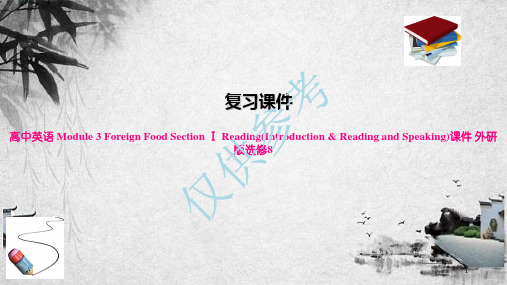
4.强调句型 It seemed to be just a bowl of grey liquid and i_t_w_a_s_ only after I had tasted it t_h_a_t_ I knew it was actually cooked with mushrooms. 看上去那只是一碗灰色的液体, 我尝了一下后才知道 那实际上是用蘑菇做的。
7
As every coin has two sides, fast food also has its disadvantages such as lack of nutrition and dull taste.Nevertheless, these are minor points compared with its advantages.Since most people agree with fast food, it tends to grow more rapidly.
复习课件
高中英语 Module 3 Foreign Food Section Ⅰ Reading(Introduction & Reading and Speaking)课件 外研 版选修8
1
Module 3 Foreign Food
2
单元话题链接
In present-day China, we can find two types of fast food:
22
Everyone else⑨ just tasted a bit of each dish and then put their chopsticks⑩ down, continuing to chat⑪. “They can't have very big appetites,” I thought.
高中英语 Module 3 Foreign Food Period One Introductio

Module 3 Foreign Food Period One Introduction,Reading andVocabulary 同步精练(时间:45分钟)Ⅰ.介副词填空1.In fact,I think that they are sometimes obsessed________it.2.She fell asleep________the light burning.3.Everyone else just tasted a bit of dish and then put their chopsticks________,continuing to chat.4.________my surprise,more dishes arrived,plus soups,side dishes,and desserts. 5.Maybe I'll get used________that,too—someday.6.I was amazed________their easy and graceful manner while I stood there feeling somewhat confused by the food.7.It was quite hard to make________what they contained.8.The waiter put these foods inside bread or potatoes according________people's requirements.答案 1.with 2.with 3.down 4.To 5.to 6.at7.out 8.toⅡ.单词拼写1.My first experience of this aspect of a Chinese culture came at a b________duringa trip to Beijing in 1998.2.I thought this vast wave of food was the total number of dishes to be served,and I started eating g________.3.We would never mash food into an u________shape.4.But one thing I do admire is the polite m________in which British people eat,even if it is just a potato.5.Do their ideas have anything in c________?6.One evening he was________(款待) the ruler of a small island in the Pacific. 7.The________(后果) was that many people were overweight.8.The________(臭名昭著的) choudoufu is an example.答案 1.banquet 2.greedily 3.unrecognizable 4.manner mon 6.entertaining 7.consequence 8.infamousⅢ.翻译与仿写1.Everything you see I owe to spaghetti.翻译:_____________________________________________________________仿写:由于工作努力,他在那个领域取得了巨大的成就。
高二英语Module3 Foreign food知识精讲 外研社
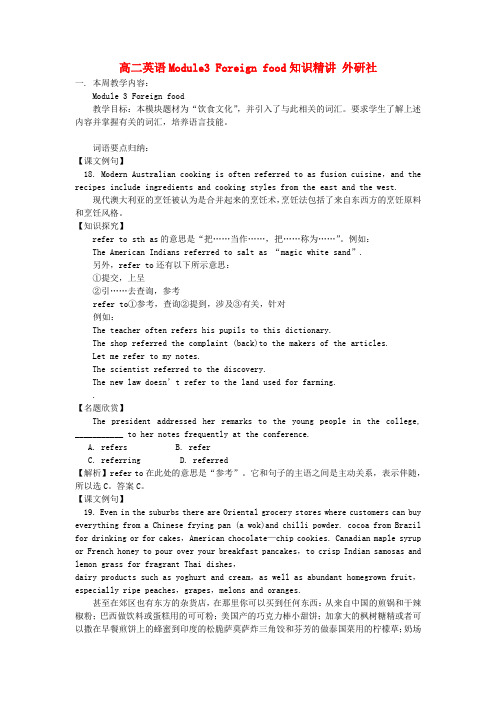
高二英语Module3 Foreign food知识精讲外研社一. 本周教学内容:Module 3 Foreign food教学目标:本模块题材为“饮食文化”,并引入了与此相关的词汇。
要求学生了解上述内容并掌握有关的词汇,培养语言技能。
词语要点归纳:【课文例句】18. Modern Australian cooking is often referred to as fusion cuisine,and the recipes include ingredients and cooking styles from the east and the west.现代澳大利亚的烹饪被认为是合并起来的烹饪术,烹饪法包括了来自东西方的烹饪原料和烹饪风格。
【知识探究】refer to sth as的意思是“把……当作……,把……称为……”。
例如:The American Indians referred to salt as “magic white sand”.另外,refer to还有以下所示意思:①提交,上呈②引……去查询,参考r efer to①参考,查询②提到,涉及③有关,针对例如:The teacher often refers his pupils to this dictionary.The shop referred the complaint (back)to the makers of the articles.Let me refer to my notes.The scientist referred to the discovery.The new law doesn’t re fer to the land used for farming..【名题欣赏】The president addressed her remarks to the young people in the college, ___________ to her notes frequently at the conference.A. refersB. referC. referringD. referred【解析】refer to在此处的意思是“参考”。
高中英语Module3ForeignFoodSectionⅠIntroduction

3 Foreign FoodThe United Kingdom (UK) is located in the west of the mainland of Europe. Farmers in this country produce about 60 percent of the food the UK needs. From 1980-1990, farmers used machines to plant and harvest crops. The productivity (生产力) of UK farms increased by about 10 percent during that period. More farmers would raise animals rather than plant crops. Some of the world's best beef and lamb is produced in the UK.The UK consists of England, Wales, Scotland, and Northern Ireland. Each region has its own special cuisine. The English cooking style didn't use many spices and was sometimes criticized for its taste. During the 1700s and 1800s, English explorers and colonists traded and developed settlements (居留地) in the Caribbean region, Asia, Africa, and North America. The English were influenced by the cultures of their colonies, so English cooking began to use new spices and cooking techniques learned from countries like India.Throughout the UK, meat pie is popular. It combines ground meat, vegetables, and potatoes inside it. Other popular meals are fish and chips. They are popular takeout foods. At around 4 p.m., people in the UK traditionally took a break for tea. Traditional “high tea” included formal preparation of tea, accompanied finger food, like cucumber sandwiches. People living in the modern UK are sometimes too busy to have a break for traditional high tea, but most people still stop their work activities for a tea break at around 4 p.m. Tea and cookies are the common food for this break.Traditionally, the British eat four meals a day, including breakfast, lunch, tea, and dinner. The traditional breakfast includes eggs, sausage, mushrooms, tomatoes, and fried bread. However, many English people now have no time to cook such breakfast, and just eat a wheat cereal. In casual conversations, the British use the term “pudding (布丁)” in a general way to refer to dessert, even if the dessert served is not pudding.Section_ⅠIntroduction_&_Reading_—_P rereading[原文呈现]Passage 1Chinese people think a lot about food. In fact, I think that they are sometimes obsessed① with it. My first experience of this aspect② of Chinese culture came at a banquet③during a trip to Beijing in 1998. I had eaten Chinese food often, but I could not have imagined how fabulous a real Chinese banquet could be. The first six or seven dishes④ seemed to fill the table, with plates dangerously balanced⑤ one on top of another⑥. I thought this vast wave of food was the total number of dishes to be served⑦, and I started eating greedily⑧. Everyone else⑨ just tasted a bit of each dish and then put their chopsticks⑩down, continuing to chat⑪. “They can't have very big appetites,” I thought.To my surprise⑫, more dishes arrived, plus soups, side dishes, and desserts ⑬. There was enough to feed a whole army. No wonder⑭ my fellow guests had had only a few bites of each dish; they knew what was still to come. But I was already so full that I could only watch as the banquet continued⑮.[读文清障]①obsess/əb'ses/v.使着迷be obsessed with/by着迷于②aspect n.方面③banquet/'bæŋkwIt/n.宴会④dish/dIʃ/n.一道菜⑤balance v.使保持平衡,立稳balance ... on ...把……平稳地放在……上面⑥with plates ...是with复合结构,在句中作状语。
2017_2018学年高中英语Module3ForeignFoodSectionⅠIntroduct
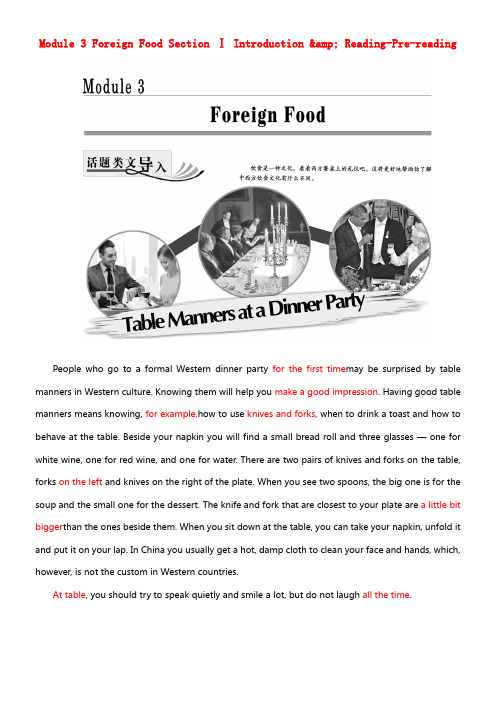
⑧greedily/'griːdIli/adv.贪婪地
greedn.贪婪,贪婪 greedyadj.贪婪的,贪婪的
⑨everyone else其他人,else修饰不定代词或不定副词时,必需后置。
⑩chopstick/'tʃɒpˌstIk/n.(常复)筷子
a pair of chopsticks一双筷子
⑪continuing to chat是此刻分词短语作伴随状语。
⑫to one's surprise使某人吃惊的是
假设修饰此类短语,可在to前面加上much或greatly。
⑬dessert/dI'zɜːt/n.甜食 desertn.沙漠v.遗弃,擅离
when I got used to it是时刻状语从句。
appetising/'æpəˌtaIzIŋ/adj.开胃的,增进食欲的
that引导的定语从句,修饰substance。
somedayadv.(以后)有一天 one day(过去或以后)有一天
[第3~5段译文]
中国“饮食文化”的另外一方面是中国人似乎会食用几乎所有动物的任一部位——这令很多西方人深感恐怖。胃、肠子、耳朵、舌头、尾巴、蹄子和肺都可能在你眼前的餐桌上被消灭掉。我第一次看到一个三岁的小孩轻巧地嚼着一个鸡头时,我做了好几周的噩梦。
must have thought“必然以为”,表示对过去情形的确信推测。
that引导的定语从句,修饰foods。
infamous/'Infəməs/adj.污名昭著的,臭名远扬的
get used to适应于 be used to do被用来做
高中英语Module3ForeignFoodSectionⅠIntroductionReadinga
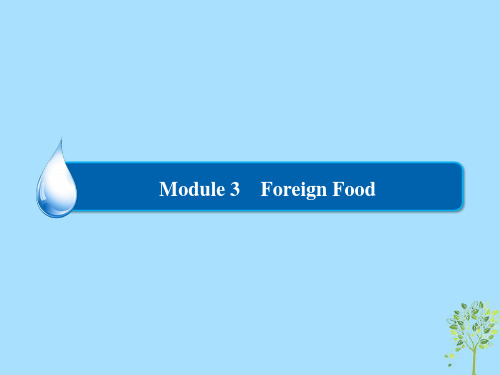
3. The first time I saw a three-year-old kid cheerfully chewing a chicken's head I had bad dreams for weeks.
[信息提取] the first time相当于从属连词,引导状语从 句,译为“第一次……”。
D. Atቤተ መጻሕፍቲ ባይዱlast he could only watch as the banquet continued.
答案:B 从文中第一段得知,他认为那些便是所有要上 的菜了,于是就大口地吃起来,以至于到后来吃得太饱,对于 下面的菜,只有看着的份了。
2. What impressed the writer most at the banquet? A. At first, everyone just tasted a bit of each dish. B. How bad a real Chinese banquet could be. C. The quantity of food served. D. He saw a kid cheerfully chewing a chicken's head.
13. variety ( n.) 多样性 →various ( adj.) 各种各样的 14. taste ( v.) 品尝 →tasty ( adj.) 美味的;引起食欲的 15. experience ( v.) 经历;经验 →experienced ( adj.) 有经验的
短语完形 1. be obsessed with 着迷于…… 2. owe to 归功于 3. no wonder 难怪 4. make out 理解;辨认出 5. in a ...manner 用……方式 6. have ...in common 与……有共同点
高中英语选修8Module3ForeignFood-Reading课件(外研版)

高中英语选修8 Module3 Foreign Food-Reading课件(外研版)ks5u精品课件 Module 3 Foreign food Reading * * Introduction Introduction IntroductionIntroduction Introduction IntroductionIntroduction Introduction IntroductionIntroduction Reading and vocabulary 1 Reading andvocabulary 1 1. owe The food cost £4 , but I only paid £3 so I still owe £1. I owe you an apology. She owes h er success to good luck. I owe him ten dollars. He owes his success tohis hard work. I owe you for your help Reading and vocabulary1 2. taste 尝,品尝 Can I taste your drink? This tea tastes sweet. He hadn't tasted food for three days. This soup tastes of chicken. One can taste nothing when o ne has a cold. Reading and vocabulary 1 3. wonder He's a wonder. I wonder in England, each man speaks a different language. I wonder why James isalways late for school. It’s a wonder…难得……;奇怪的是…… It’s no wonder…难怪……;……并不奇怪no [little, small] wonder that... 难怪...... Reading and vocabulary 14. manner Why are you talking in such a strange manner? It'sbad manners to talk with a full mouth. You should have goodmanners all the time. The manner of presentation is highlyimportant. He had an absent-minded manner. Mind your manners.good manners 有礼貌 bad manners 没礼貌 Reading and vocabulary 1 method, manner, way method 所表示的“方法”可以指做某件事的具体步骤或程序,也可以指抽象概念“条理”。
- 1、下载文档前请自行甄别文档内容的完整性,平台不提供额外的编辑、内容补充、找答案等附加服务。
- 2、"仅部分预览"的文档,不可在线预览部分如存在完整性等问题,可反馈申请退款(可完整预览的文档不适用该条件!)。
- 3、如文档侵犯您的权益,请联系客服反馈,我们会尽快为您处理(人工客服工作时间:9:00-18:30)。
Module 3 Foreign Food Section Ⅰ Introduction &Reading-Pre-readingPeople who go to a formal Western dinner party for the first time may be surprised by table manners in Western culture. Knowing them will help you make a good impression. Having good table manners means knowing, for example,how to use knives and forks, when to drink a toast and how to behave at the table. Beside your napkin you will find a small bread roll and three glasses — one for white wine, one for red wine, and one for water. There are two pairs of knives and forks on the table, forks on the left and knives on the right of the plate. When you see two spoons, the big one is for the soup and the small one for the dessert. The knife and fork that are closest to your plate are a little bit bigger than the ones beside them. When you sit down at the table, you can take your napkin, unfold it and put it on your lap. In China you usually get a hot, damp cloth to clean your face and hands, which, however, is not the custom in Western countries.At table, you should try to speak quietly and smile a lot, but do not laugh allthe time.Section_ⅠIntroduction_&_Reading_—_Prereading[原文呈现]Passage 1Chinese people think a lot about food. In fact, I think that they are sometimes obsessed① with it. My first experience of this aspect② of Chinese culture came at a banquet③ during a trip to Beijing in 1998. I had eaten Chinese food often, but I could not have imagined how fabulous a real Chinese banquet could be. The first six or seven dishes④ seemed to fill the table, with plates dangerously balanced⑤one on top of another⑥. I thought this vast wave of food was the total number of dishes to be served⑦, and I started eating greedily⑧. Everyone else⑨ just tasted a bit of each dish and then put their chopsticks⑩down, continuing to chat⑪. “They can't have very big appetites,” I thought.To my surprise⑫, more dishes arrived, plus soups, side dishes, and desserts ⑬. There was enough to feed a whole army. No wonder⑭ my fellow guests had had only a few bites of each dish; they knew what was still to come. But I was already so full that I could only watch as the banquet continued⑮.[读文清障]①obsess/əb'ses/v.使着迷be obsessed with/by着迷于②aspect n.方面③banquet/'bæŋkwIt/n.宴会④dish/dIʃ/n.一道菜⑤balance v.使保持平衡,立稳balance ... on ...把……平稳地放在……上面⑥with plates ...是with复合结构,在句中作状语。
⑦to be served是动词不定式的被动式作后置定语,修饰dishes,表将来。
⑧greedily/'griːdIli/adv.贪婪地greed n.贪心,贪婪greedy adj.贪婪的,贪心的⑨everyone else其他人,else修饰不定代词或不定副词时,必须后置。
⑩chopstick/'tʃɒpˌstIk/n.(常复)筷子a pair of chopsticks一双筷子⑪continuing to chat是现在分词短语作伴随状语。
⑫to one's surprise使某人吃惊的是若修饰此类短语,可在to前面加上much或greatly。
⑬dessert/dI'zɜːt/n.甜食desert n.沙漠v.遗弃,擅离⑭no wonder难怪It's no wonder that ...难怪……⑮本句是so ... that ...结构,句中as引导了一个时间状语从句。
第一篇[第1~2段译文],中国人对食物想法颇多。
事实上,我觉得他们有时候对此到了痴迷的程度。
我第一次体验中国文化的这一方面是于1998年在北京旅游时的一次宴会上。
我以前也经常吃中餐,但从没有想到真正的中式宴席会那么丰盛。
首先上来的六七个菜好像就已经填满了桌子,盘子都很危险地交互摞着。
我以为这么多的食物就是所有要上的菜了,便开始贪婪地吃起来。
其他的人都只是对每个菜尝了一点儿,然后放下筷子继续聊天。
我想:“他们可能胃口不大。
”,使我惊奇的是,更多的菜又被端上来了,加上汤、小菜及甜点,这些菜够一整个军队的人吃了。
怪不得跟我一起的客人们每道菜也就浅尝几口,他们知道还有什么菜要上呢。
但是我已经吃得太饱了,以至于宴席还继续着的时候我只有看的份儿了。
Another aspect of “food culture” is that the Chinese seem to eat almost every part of every animal⑯—much to the horror of⑰ many westerners. Stomach, intestines ⑱, ears, tongue⑲, tail, hoof⑳, and lungs are all likely to end up○21 on the dinner table in front of you. The first time○22 I saw a thre eyearold kid cheerfully23 a chicken's head I had bad dreams for weeks.chewing○24 the UnitedThese days I enjoy that sort of food myself. On a recent trip to○25 some Chinese delicacies○26, and asked the guy at the States I suddenly felt like○meat counter of a supermarket, “Do you have pigs' ears?”“No,” he said, pulling at his own ear○27,“just these ordinary ones.” He must have thought○28 I was joking.29.However, there are other kinds of foods that have taken longer for me to accept○30choudoufu is an example. (The name says it all: “stinky tofu”.) Just The infamous○32,I found another variety on a trip to Hunan: deepfried when I got used to○31 it○choudoufu, a horrible black substance that looked and smelled about as appetising○33 as a burnt tennis shoe○34. Maybe I'll get used to that, too — someday○35.⑯that ... every animal是表语从句。
⑰much to the horror of sb.令某人深感恐怖的是⑱intestine/In'testIn/n.(常复)肠⑲tongue/tʌŋ/n.舌头⑳hoof/huːf/n.(猪、牛等的)蹄21end up结束;(尤指经历一系列意料之外的事情后)最终处于……end ... with以……○结束……22the first time是名词词组,起连词作用,引导时间状语从句。
